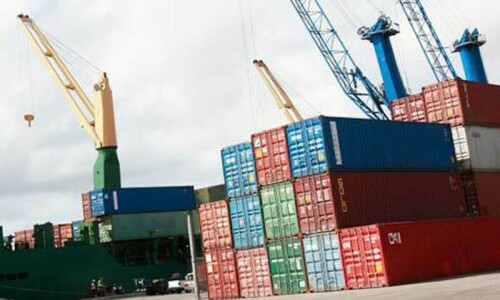
• Shehbaz will give opening speech at plenary session, where organisation’s budget will also be approved
• Iran’s first vice president pulls out due to regional situation
• Bilateral meetings held with leaders of Tajikistan, Kazakhstan, Turkmenistan and Belarus
• Indian foreign minister also in town for summit
ISLAMABAD: Prime Minister Shehbaz Sharif on Tuesday evening hosted a welcome dinner for the dignitaries from various member states on the first day of the two-day Shanghai Cooperation Organisation (SCO) summit.
While PM Shehbaz will preside over the summit on Wednesday as the current Chair of the Council of the Heads of Government, footage from Tuesday night showed him welcoming and shaking hands with dignitaries, including India’s Minister for External Affairs Dr Subrahmanyam Jaishankar, with whom he also had a brief exchange.
Leaders from SCO member states arrived in Islamabad on Tuesday for the 23rd Council of Heads of Governments meeting, where discussions will center around trade, economic cooperation, and regional connectivity within the Eurasian political and security bloc.
The summit will approve the organisation’s budget and address key issues related to economic collaboration among member states.
The meeting is being attended by the heads of government of eight member states, while Iran and India will be represented by their trade and external affairs ministers, respectively, after Iranian first vice president Mohammad Reza Aref had to pull out at the last minute due to the evolving regional situation requiring his presence in Tehran.
Mongolia is participating as an observer state, and Turkmenistan has been invited as a special guest. Representatives from international organisations, including the Conference on Interaction and Confidence Building Measures in Asia, the Commonwealth of Independent States, and the European Economic Community, are also attending the event.
Foreign Office spokesperson Mumtaz Zahra Baloch earlier told a private TV channel that climate change and economic challenges, faced by some member states, were on agenda of the summit. In a statement, the FO spokesperson said, the hosting of CHG reflected Pakistan’s abiding commitment to the purposes and principles of the SCO charter and the values of the Shanghai Spirit.
The plenary session proceedings will begin with an opening speech by PM Shehbaz who will chair the summit, followed by speeches by the foreign dignitaries. The session will conclude with a document-signing ceremony.
SCO Secretary-General Zhang Ming along with Foreign Minister Ishaq Dar will later share with the media the highlights and outcomes of the summit. An official luncheon will be hosted for the participating leaders afterwards.
Leaders arriving on Tuesday included Belarusian Premier Roman Golovchenko, Tajik Prime Minister Qohir Rasulzoda, Indian External Affairs Minister Dr Jaishankar, Kazakh PM Olzhas Bektenov, Kyrgyz head of the cabinet of ministers Akylbek Japarov, Mongolian PM Oyun-Erdene Luvsannamsrai, and Turkmen deputy chairman Rashid Meredov.
Iran’s minister for trade, industry, and mines Seyyed Mohammad Atabak and Russian premier Mikhail Mishustin arrived late in the night at Nur Khan airbase, while Uzbek premier Abdulla Aripov was expected to arrive shortly afterwards.
Both Indian and Pakistan foreign offices had ruled out bilateral talks between the two states, Jaishankar’s visit attracted significant media attention, as this was the first senior ministerial-level visit from India in nearly a decade. In 2015, as foreign secretary, he had accompanied the then Minister for External Affairs Sushma Swaraj.
Jaishankar arrived on an Indian Air Force plane, which remained at Pakistan Air Force’s Nur Khan airbase overnight.
The media also focused on Jaishankar’s appearance at an informal dinner hosted by PM Sharif for the participating leaders at the PM House. A video clip captured the moment as PM Sharif welcomed him with a handshake and a brief conversation.
Bilateral meetings
The leadership of Tajikistan, Kazakhstan, Turkmenistan and Belarus also held bilateral meetings with PM Shehbaz, who is chair of the SCO’s Council of the Heads of Government, on Tuesday.
In a meeting with Tajik Prime Minister Qohir Rasulzoda, Prime Minister Shehbaz Sharif expressed his commitment to deepening bilateral cooperation.
During discussions with Kazakh counterpart Olzhas Bektenov, PM Shehbaz emphasised the importance of enhancing collaboration in trade, investment, transport, connectivity, agriculture, defence, education, and energy. Both leaders agreed to increase official exchanges to further bilateral ties. He also invited President Kassym-Jomart Tokayev to visit Pakistan.
During his interaction with Foreign Minister Rashid Meredov, who is deputy chairman of the Cabinet of Ministers of Turkmenistan, PM Shehbaz conveyed Pakistan’s desire for stronger bilateral relations, especially in trade, energy, and regional connectivity.
Belarusian Prime Minister Roman Golovchenko in a meeting with PM Shehbaz discussed expanding trade, investment, agricultural cooperation, and connectivity between the two countries.
PM Golovchenko also met Pakistan’s army chief, General Asim Munir, who expressed interest in strengthening military ties between the two nations. According to military’s media wing, regional security dynamics also came under discussion.
Currently, the SCO comprises China, India, Russia, Pakistan, Iran, Kazakhstan, Kyrgyzstan, Tajikistan, Uzbekistan and Belarus — with 16 more countries affiliated as observers or “dialogue partners”.
Pakistan became a full member of the SCO at its 2017 summit in Kazakhstan, which was attended by ex-PM Nawaz Sharif, who recently also expressed hope for reviving ties with India.
Published in Dawn, October 16th, 2024













































Dear visitor, the comments section is undergoing an overhaul and will return soon.